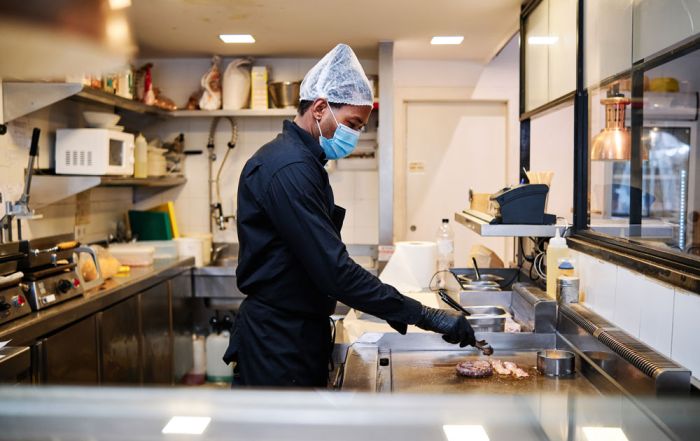Remembering the Importance of Food Safety During Food Safety Education Month
In the foodservice industry, every plate that leaves your kitchen carries not just flavors and aromas, but also the responsibility of providing safe and wholesome meals to customers. Celebrated each September, National Food Safety Education Month provides a platform for foodservice professionals to reaffirm their commitment to food safety. It’s a reminder that excellence in foodservice operations must always be accompanied by excellence in food safety; a reminder that any great meal begins with safe food as the foundation.
With everything you face as a foodservice operator, why should National Food Safety Education Month be so important for your business? If you’ve read these blogs at all, you have likely read about the importance we place on building a culture of food safety. September can be the month that you refocus your values. Your food safe culture begins with you as a manager, how you interact with your employees and where you place emphasis in your daily operations. A food safety culture values food safety – remember that your priorities can change daily, but your values stay the same. Use September to reaffirm your values with your employees and your customers.
Food safety is not just a regulatory requirement; it helps to establish and build trust with your customers. When patrons dine out, they trust that their meal will be safe to eat. By actively participating in National Food Safety Education Month, foodservice establishments reinforce their commitment to maintaining this trust with their guests.
Food safety may play a behind-the-scenes role, but its importance cannot be overstated.
For most operators, this is a great time to revisit some of our food safety practices that may have weakened during the peak summer months. What better time to do this than during this lull between summer and the holiday season? What are some ways in which you can participate in food safety month? Here are a few ideas to consider.
- Reinforce the importance of food safety training with your employees. Knowledge is the first line of defense against foodborne illnesses. Comprehensive food safety training for your staff should be a goal that all operators strive to achieve.
- If you have a HACCP program, or components of a HACCP program, conduct a thorough audit of the plan or program you have in place. Is it working? What could be improved? Engage employees in the process early on – they are truly the ones who know how it can be improved.
- Revisit your Master Cleaning Schedule, has it been kept up-to-date? Ensure that all equipment and utensils are properly cleaned and sanitized after use and are maintained appropriately. Not only will this help protect the food supply, but it will also help in extending the useful life of your equipment.
- Take a few minutes and double check your food safety supplies. Make sure your employees have the correct amounts and sizes of gloves, handwashing supplies, and cleaning chemicals to use on the job. Also be sure to inventory thermometers, and while you’re at it, make sure they are properly calibrated.
Food safety may play a behind-the-scenes role, but its importance cannot be overstated. As we honor National Food Safety Education Month, let us celebrate the dedication and commitment of foodservice professionals who work tirelessly to ensure that dining experiences are not only memorable but also free from foodborne risks. Risk nothing,
READ MORE POSTS
Don’t Underestimate the Importance of Employee Health as we head into the Winter Months
Early this month, I ran across an article discussing an outbreak investigation in the Australian Capital Territory. The outbreak caused more than 200 people to fall ill and was one of the most widespread outbreak investigations in the history of the territory. The cause was traced back to Norovirus, a virus I am sure you have heard us opine about in this blog before.
Exclusion and Restrictions: Understanding Employee Health and the Food Code
I received a call earlier in the month from a foodservice operator who suspected that one of their employees may have fallen ill and wondered if they had to send the employee home for the day. Once I started to ask a few more questions, it became obvious that the operator wasn’t really in-tune with the food code requirements on restrictions or exclusions for employees who may not be feeling well. Given that most operations are dealing with staff shortages currently and the fact that we are about to head into the fall and winter – when we tend to see an increase in upper respiratory and other illnesses, such as the flu - it seemed like a very timely and important topic for the blog this month.
Cross Contamination and the Surfaces that go Unnoticed
In October, I ran across a new research study published in the Journal of Food Protection in early-September. The article explored cross contamination in consumer kitchens during meal preparation. One of the authors was a previous SafeBites presenter, Dr. Ellen Shumaker, at North Carolina State University. Although the setting was consumer kitchens and not the commercial kitchen many of you deal with daily, the findings were very applicable to what we often see in the foodservice setting.
Emergency Preparedness: The Not-so Calm After the Storm
If you and your foodservice operation have been hit by an emergency or other disaster, what comes next and how do you move forward? Much of the answer to this is predicated on the actual disaster that you are dealing with – a flood is certainly a much different than a fire, but some of the food safety considerations remain the same if your business has been left intact and has not been damaged by the disaster.










